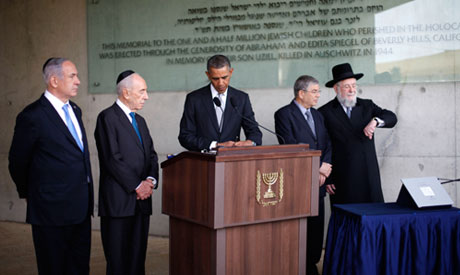
US President Barack Obama, center, signs the guest book during his visit to the Children's Memorial at the Yad Vashem Holocaust memorial in Jerusalem, Israel, Friday, March 22, 2013 (Photo: AP)
President Barack Obama conjured images of Zionist delight and Palestinian despair on a tour which revived his engagement in the Middle East but came up against stubborn obstacles to progress.
Tweaking emotions of Israelis, Obama sketched a searing picture of "a Palestinian child (who) cannot grow up in a state of her own."
Under a glaring Jerusalem sun, he laid stones on the graves of Theodor Herzl, founder of modern Zionism and Yitzhak Rabin, the Israeli leader killed by a Jewish extremist for trying to make peace.
And in drama on an airport tarmac, Obama engineered a revival of relations between US allies Israel and Turkey, after coaxing an apology out of Prime Minister Benjamin Netanyahu for Turkish deaths in a raid on a Gaza flotilla.
But despite grand gestures for which Obama is known, it remained unlikely after he left Jordan that he had significantly reshaped the region's snakepit politics.
And there were questions about just how deeply Obama would engage in the grunt work of diplomacy, now the drama of the political moment has passed.
Obama massaged every inch of Israel's self-image, lauding an ancient Jewish homeland, a haven from persecution, empathising with his hosts' sense of threatened isolation and their pride in a new hi-tech industry.
He scored two key wins, by removing the slur flung by foes at home and abroad that he has no affinity for the Jewish state.
And after a back-slapping news conference, Obama also repaired his brittle relationship with Netanyahu -- at least in public.
Obama's homage to Israel's iconic sites was a corrective after he worried Israelis with his 2009 Cairo speech to the Muslim world.
"By laying a wreath at Herzl's grave -- an act that other foreign leaders have refused to do -- President Obama was reaffirming Zionism and the idea of a Jewish state," Israel's US ambassador Michael Oren told Haaretz.
Jerusalem Post columnist Herb Keinon wrote it was important for Israelis, who wanted to be loved, to have Obama visit them in their rough neighbourhood.
"Having the most powerful man in the world come and give us a public bear hug is very important."
Obama's show of love for Israelis also came with an appeal: force your leaders to make peace with Palestinians because it is just, possible and the only way to ensure the Jewish state's survival.
A storm on Friday scuppered Obama's plans to fly by helicopter to Bethlehem's Church of the Nativity, so he took his motorcade through the West Bank separation wall.
At home or abroad, Obama looks out from his "Beast" limousine at crowds wowed by a statement of American power: a few months back he was mobbed as a liberating hero in Myanmar.
But in the West Bank, rows of sullen Palestinians gazed on in contempt, arms crossed in a show of indifference.
In Ramallah, Palestinian president Mahmud Abbas appeared disgruntled, following Obama's refusal to reinstate his call for a ban on Israeli settlement building as a condition of peace talks. There was a palpable feeling among Palestinians of busted expectations for Obama, even if US officials say Palestinians are partly to blame for the failure of his lofty calls for statehood.
"Never in my life have I seen a president kiss up to the Israelis and exaggerate their history and achievements like US President Barack Obama," wrote Abdel Bari Atwan, a Palestinian and editor-in-chief of Al-Quds al-Arabi. Secretary of State John Kerry will be the new US pointman on the Middle East, eyeing the elusive two-state solution.
"What I can guarantee is we'll make the effort," Obama said.
Reports said Obama asked Abbas not to take Israel to the International Court and Netanyahu to "silently" freeze some settlement building as part of confidence-building measures.
But given perceptions that Obama did not match rhetoric with action in the past, doubts will linger about the level of White House commitment.
Cynics might also see Obama's trip as a spot of legacy preservation.
Obama can now at least say he tried, and deflect blame for a prolonged stalemate by saying he cannot want peace more than the parties themselves.
Domestic politics in Israel and the Palestinian territories leave little reason for optimism.
Palestinians remain divided and doubts about the longevity of Abbas's rule contribute to political paralysis.
The political challenge from Hamas-run Gaza also restricts Abbas's room for manoeuvre in dealing with Israel -- just as right-wing coalition partners trim Netanyahu's breathing space on settlements. Outside events may also stall progress, including Iran.
Obama and Netanyahu did little to close differences in perceptions of the imminence of the nuclear threat.
The US leader accepted that Israel had a right to use force, but it is not known whether he asked Netanyahu to hold off to give diplomacy time to work.
Short link: